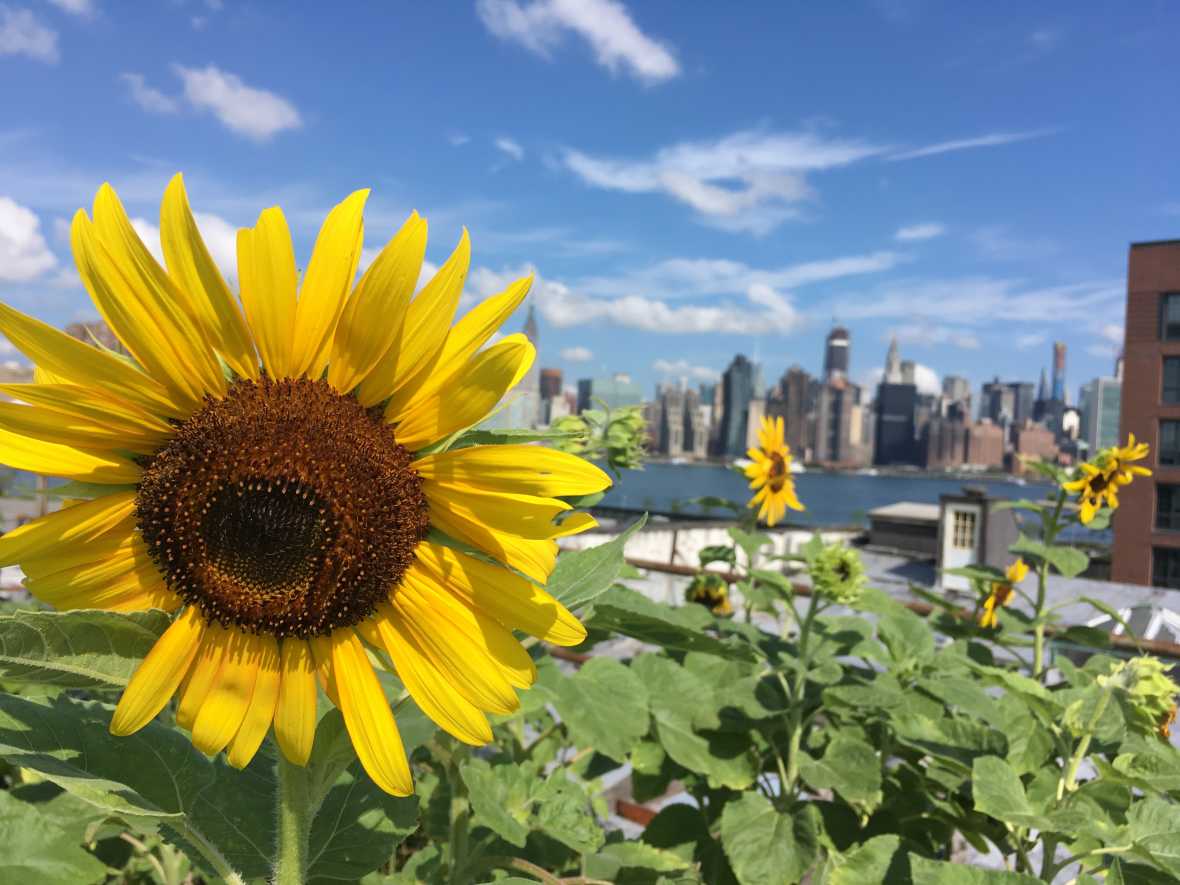From the outside, there’s nothing out of the ordinary about 44 Eagle Street, an unmarked brick warehouse in Greenpoint, Brooklyn, home to movie & tv stage company Broadway Stages. But climb up three stories, and the stairwell opens up to the nation’s first green roof-based commercial farm.
This ordinary roof supports plenty of life: rows of fluffy dill, bright orange calendula, five different types of chili peppers, swaying sunflowers, and a perennial border of wildflowers and black raspberries so full of birds, bees, and butterflies that you could almost forget you’re in the middle of New York City. Almost—except for the skyscrapers. “People are very taken aback by how calming it feels,” says Annie Novak, the founder and farm manager. “We want people to see that green roofs are practical, accessible, and beneficial, and we want them to see that when you have a green roof you can make it a community and produce-growing space as well.”
Founded in 2009, Eagle Street was part of a new wave of 21st-century urban farms transforming unloved spaces like rooftops and empty lots into vibrant oases providing New Yorkers with hyperlocal produce, as well as the opportunity to see firsthand the transformation from seed to harvest without ever needing to leave the city. Plus, urban farming is a great way to sow the seeds of new friendships.
“I think a lot of people will benefit from being able to be social and outdoors and in a community like Eagle Street Rooftop Farm,” Novak says. Maybe it’s the feeling that you’ve stumbled into a wonderful secret, shared only with the other volunteer farmers, that makes it easy to make new friends. Or maybe it’s the meditative quality of working with your hands that you get from washing bunches of radishes in a rubber bucket on a roof in the middle of New York City. “I’m feeling optimistic that we’re going to be part of the healing process that needs to happen,” Novak predicts for the 2022 season.
A new crop of urban farms seeks to not only continue to feed, but also educate and inspire New Yorkers to get their hands dirty and grow their own food. Here are just a few of the best urban farms to visit in New York City.
Eagle Street Rooftop Farm
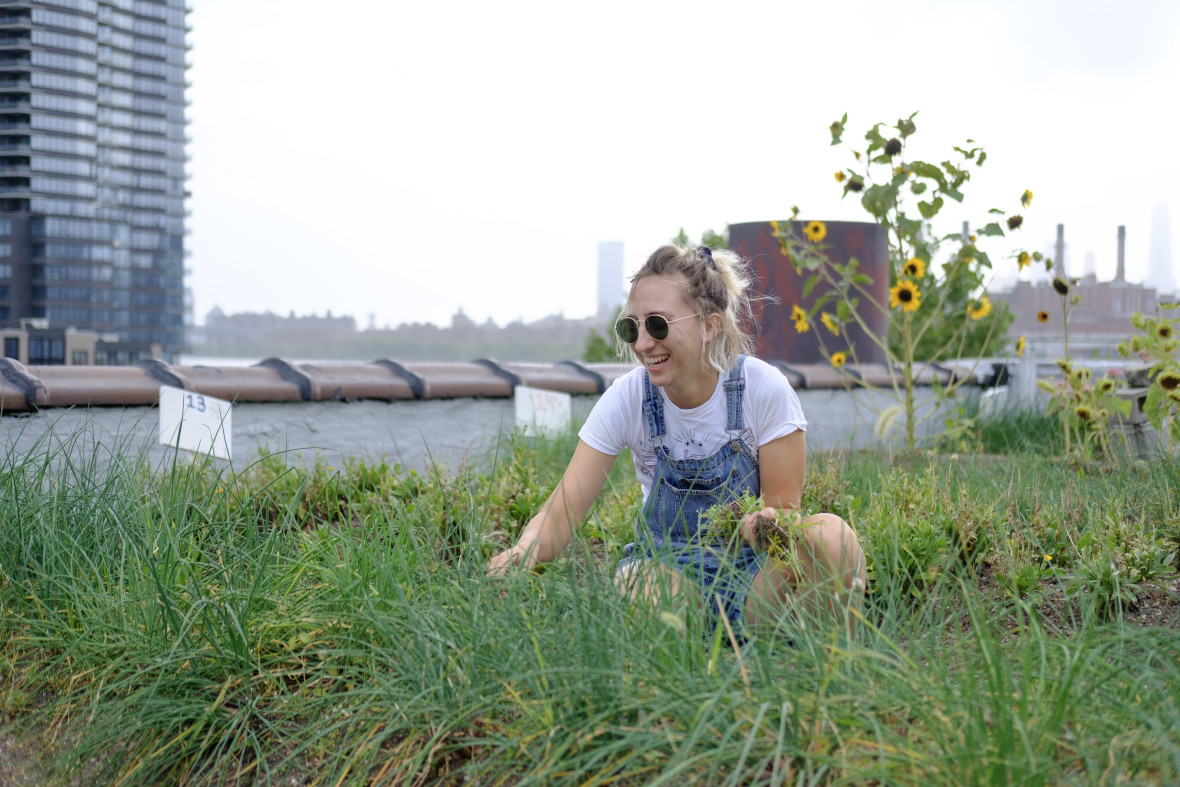
Founded in 2009, Eagle Street Rooftop Farm is the first commercial green roof farm in the United States. The 6,000-square-foot space produces herbs, kale, flowers, radishes, carrots, and peppers, which you can purchase at Market and Volunteer days. These are announced on the farm’s Instagram: @rooftopfarmer.
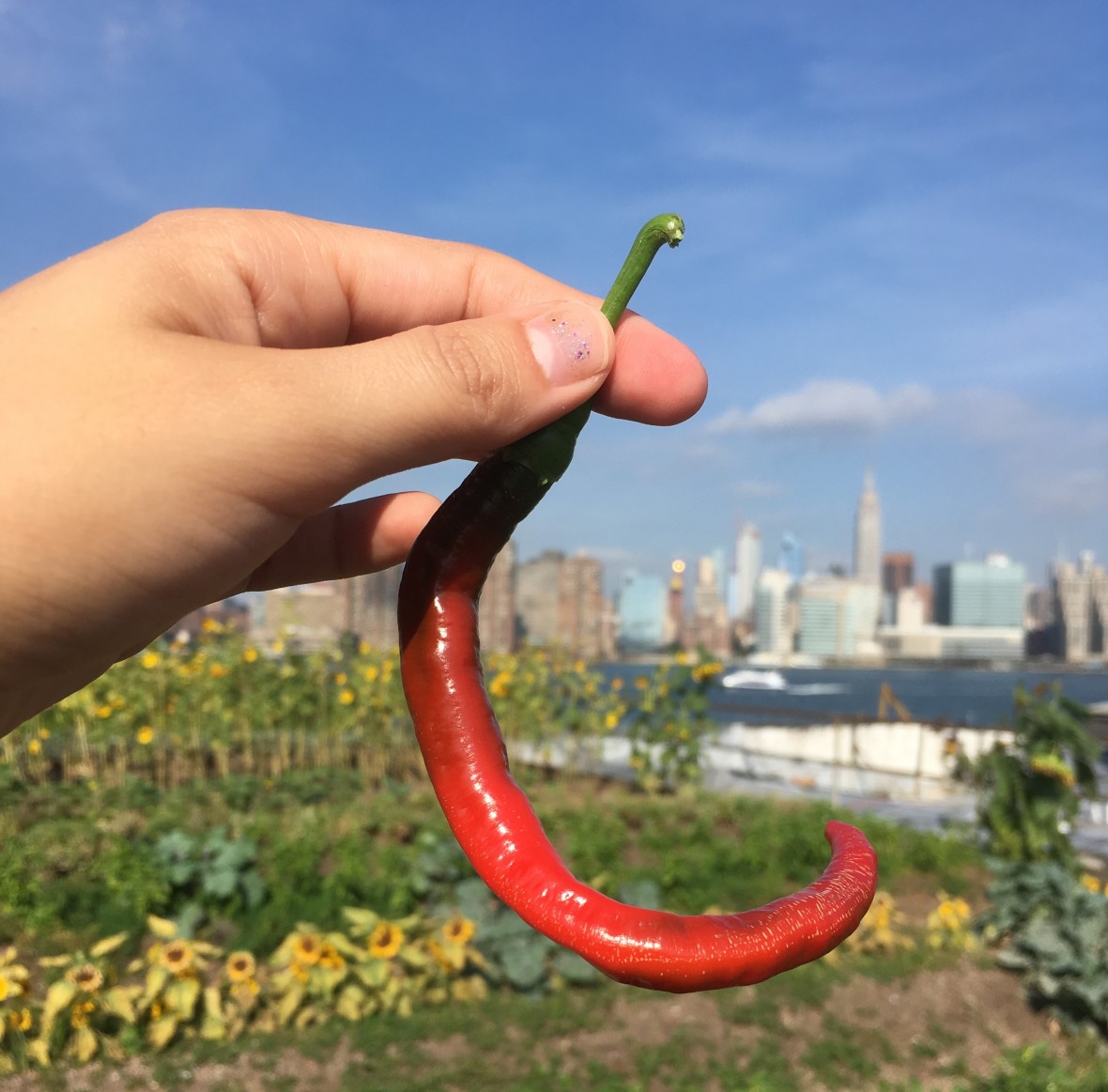
You can also get your hands dirty on Market and Volunteer days, where you’ll be put to work weeding, pruning, or turning compost alongside the farm’s team of apprentices. On particularly hot days, you might find yourself watering rows of pepper plants, which thrive in the heat of the rooftop, or assisting with a pepper harvest, seeking the ripest peppers for use in the rooftop-grown hot sauce called Awesome Sauce. In the fall, you might be tasked with helping to sow cover crops, which fix nitrogen in the ground to make nutrients available to plants come spring. If you need a break, there’s a comfy patio where you can rest, reapply sunscreen, and take in the view.
Brooklyn Grange
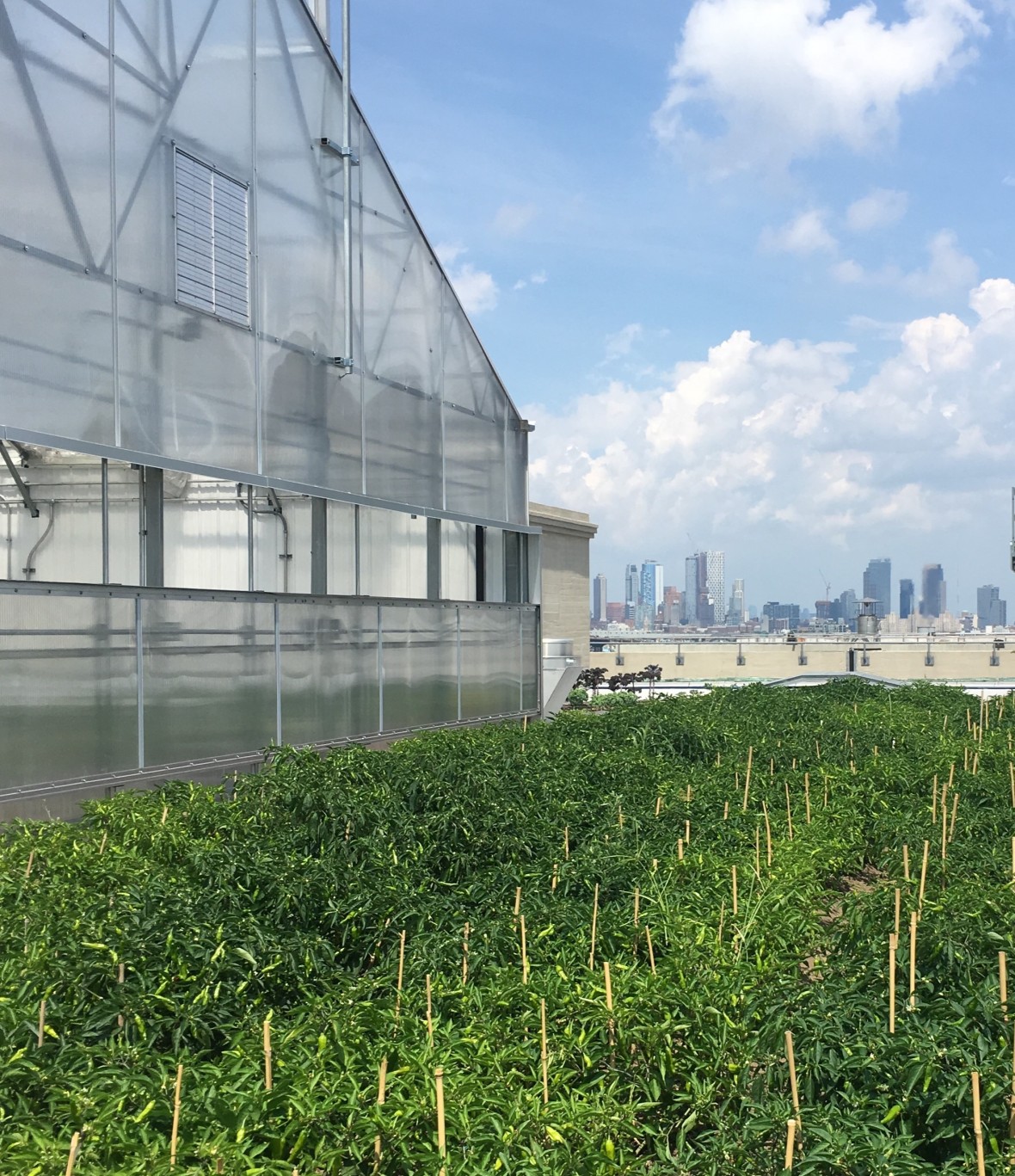
One of the co-founders of Eagle Street Rooftop Farm, Ben Flanner, was inspired by the success of Eagle Street to try something bigger. So in 2010, he founded Brooklyn Grange, which currently operates three locations across the borough for a total of 5.6 acres, making this the largest green roof row farm in the world.
Every Sunday during the summer growing season, Brooklyn Grange’s newest Sunset Park location opens to the public for a farmers’ market and open house, where you can purchase produce grown on the roof and wander along wide flagstone paths between rows of peppers, tomatoes, and lettuce, or admire the butterflies and bees flitting through the sunflowers, zinnias, and clover in the flower bed. Brooklyn Grange Sunset Park is unique in that it’s not only a production-focused farm, but it’s also designed with visitors in mind with wide pathways that allow guests to walk through the farm without disrupting the neat rows of crops and hardworking farmers. (It’s also the only farm on this list where you can host a wedding or fashion show.)
If you’re inspired to learn more about rooftop gardening, Brooklyn Grange offers ticketed workshops on everything from beekeeping to growing microgreens, as well as guided tours of its Sunset Park and Brooklyn Navy Yard locations on Tuesdays and Sundays ($10–18) from May through October. Children can experience the farm through its nonprofit education partner, City Growers, which hosts summer camps and youth-oriented workshops.
Harlem Grown
After losing his limousine business during the Great Recession, Tony Hillery started volunteering five days a week in the lunchroom of a public elementary school in Harlem. He got to know the kids there, who told him about an abandoned community garden across the street from the school. In 2011, he took over the garden, cleaned it up, and it eventually became the first site of Harlem Grown, a nonprofit organization that now operates 12 locations in Central and East Harlem, including a hydroponic greenhouse and farm on 134th Street and additional urban farms on 131st Street, 127th Street, and Riverton Houses. It also partners with five local schools as part of its core mission to “inspire youth to lead healthy and ambitious lives.”
During Saturdays on the Farm from May through October, Harlem Grown opens two of its sites to the public. Start your morning with free yoga at the Impact Farm on 127th Street, followed by drop-in volunteer hours. Families can enjoy youth-friendly programming at the 134th Street location, starting with a kid-friendly movement warm-up, followed by storytime, a cooking demo and lunch, and farm activities like watering and mushroom care. Kids can practice digging to their heart’s content in a raised-bed sandbox, hexagonal like the honeycomb of the farm’s beehives, while adults sift compost, prep beds, and care for the farm’s flock of hens. Harlem Grown provides a safe space for kids to slow down and discover new foods and new bugs, but it’s just as inspiring for the adults to work with their hands and create memories with their children.
Oko Urban Farms
In 2013, Yemi Amu converted an abandoned lot on Moore Street in East Williamsburg into Oko Urban Farms, the first outdoor aquaponics farm in New York City. Aquaponics is a farming technique that involves raising freshwater fish alongside vegetables in a closed-loop system: wastewater from the fish fertilizes the crops, and the plants filter the water, returning clean water to the fish. At Oko Farms, those vegetables include West African crops like garden egg, a member of the eggplant family with a cucumber-like crunch, è̩fó̩-gbúre (yoruba/waterleaf), okra, millet, and amaranth greens. You can purchase some of these crops at on-site farm stands, as well as through partnerships with organizations like the Weeksville Heritage Center, a nonprofit dedicated to preserving and celebrating the legacy of Black culture in Weeksville, Brooklyn.
“Urban farms have a unique opportunity to educate, raise awareness, and pass on tools for resilience. They are also places to explore the connections between agriculture and other facets of life including history, culture, [and] science,” Yemi shared on the farm’s Instagram (@okofarms), where you can learn more about the crops they grow, as well as seasonal farm stands and occasional volunteer opportunities.
In 2021, Oko Urban Farms established a second location located in the 10,000-square-foot River Street Farm Collective, a space with stunning views of the Williamsburg bridge and Manhattan skyline that they share with partners Island Bee Project, Compost Power, Billion Oyster Project, and City Growers. The new East River–adjacent site hosts events and workshops like Introduction to Aquaponics, a 90-minute class covering the history and basic science behind this technique, as well as how to start your own aquaponics garden, from fish selection to garden design.
Queens County Farm Museum

Visiting Queens County Farm Museum feels like a step back in time. The largest remaining tract of farmland in New York City, this land has been farmed continuously since 1697. Open daily year-round and free to the public, this is the only place in New York City to see a full range of livestock, including alpaca, pigs, cattle, sheep, goats, chickens, and the largest bee apiary in the City.
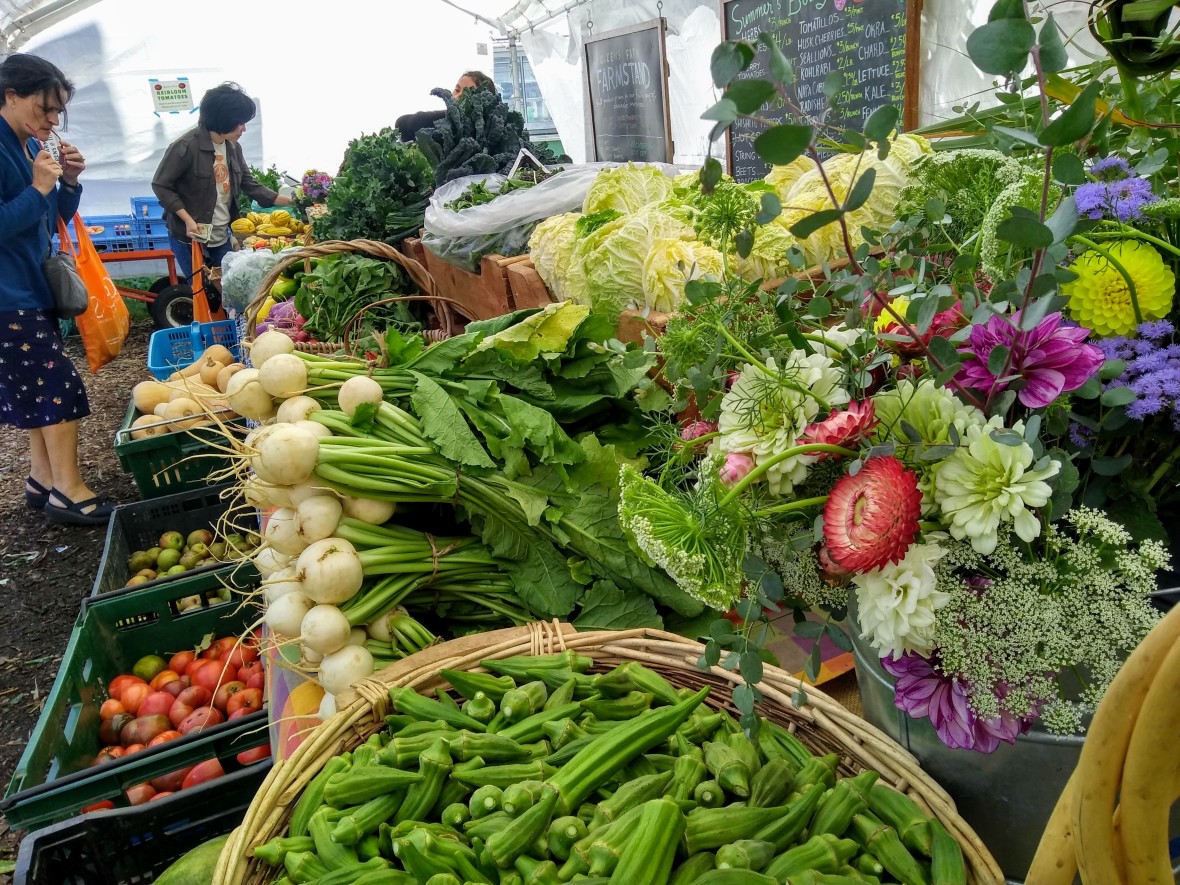
Take a self-guided tour through forty-seven acres of 200 different crops, or take a hayride ($5/person) through the property. Kids will enjoy the Children’s Garden and the opportunity to feed the sheep and goats. Stop by the farmstand and farm store on the way out to pick up produce, eggs, wildflower honey, and wool.
Randall’s Island Urban Farm
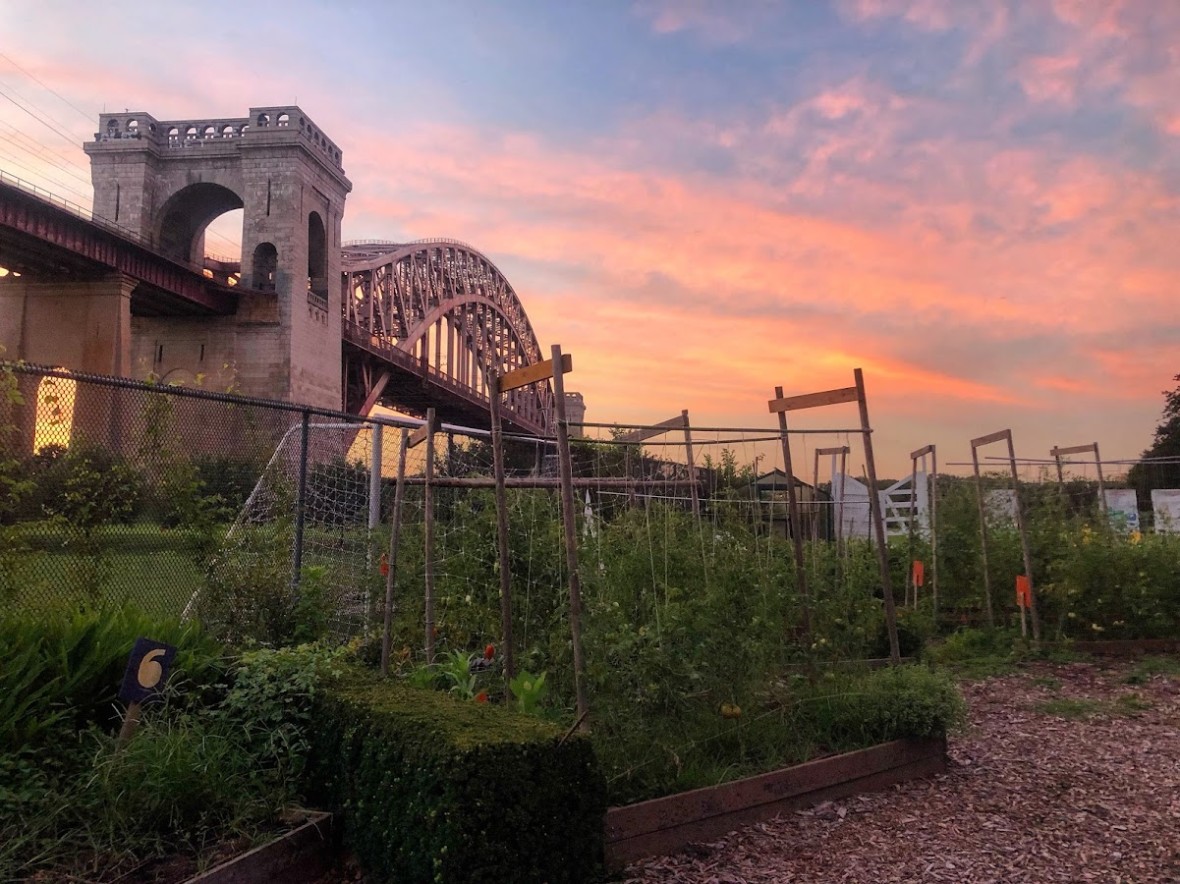
Randall’s Island Urban Farm hosts schools during the week, but every weekend from April to October, this one-acre educational farm opens to the public for its Farm Exploration Days. “We try to grow crops that are representative of the cultures that surround Randall’s Island, a unique space bordered by Western Queens, South Bronx, and East Harlem,” says farm manager Ciara Sidell.
As you walk through over 100 garden beds, you’ll notice kid-friendly signage in multiple languages explaining the historical and cultural significance of some of the over 200 varieties of fruits and vegetables grown on the farm. “Our space is designed specifically with teaching and learning in mind,” says Ciara, known affectionately as “Farmer C” by her young students.

Randall’s Island is an educational, not commercial, farm—all of its produce either gets used in its cooking classes or donated to organizations like LSA Family Health Service, which supports families in nearby East Harlem. As a result, it boasts more varieties than your typical production-focused farm. Think: deep purple okra with gorgeous butter-yellow flowers or tiny carrots the size of your thumb. New crops for the 2022 season include taro and ginger, plus shiitake and oyster mushrooms. Different varieties of the same crop grow side-by-side, providing not only some insurance against pests (which tend to flock to one variety, sparing the others), but delighting the senses and opening visitors’ eyes to the sheer variety of colors, shapes, and flavors of fruits and vegetables you won’t find at your local grocery store or bodega.
“It’s always fun to engage all five senses in an urban farm. Ours, in particular, is designed with that in mind,” says Ciara. “Folks can smell the herbs and (with permission) maybe taste something that’s growing in the fields, and feel the various plants that are exciting to touch.” Randall’s Island also hosts two free, adults-only Cocktails on the Farm evenings, on July 22 and September 10 in the 2022 season.
Wave Hill
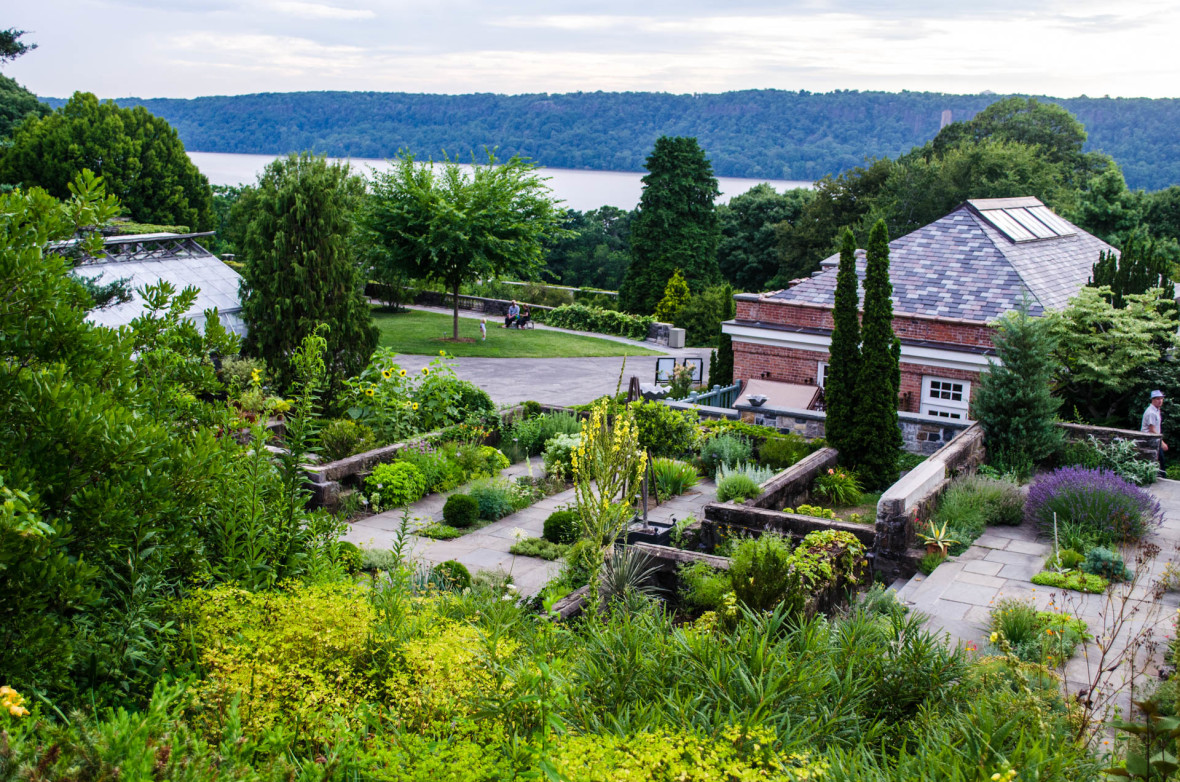
Wave Hill isn’t technically a farm, but, with year-round programming, it’s a great way to get a taste of nature while most of the city’s urban farms are closed for the winter. It’s also a favorite spot among urban farmers who want the feel of getting out of the city without actually leaving the city limits.
Located on 28 acres of green space in the Bronx, this area has magnificent views of the Palisades and a rich farming history: farmers in the neighborhood supplied food to Downtown Manhattan as it urbanized. Today, Herb and Dry Gardens occupy the former site of greenhouses used to grow vegetables in the winter. The glass structures are long gone, but the greenhouses’ stone foundations remain as a hint to this area’s agrarian history. They also help prevent the shining sumac (Rhus copallina), a leafy shrub native to eastern North America, from taking over the Dry Garden. You may know sumac as the acidic spice popular in Middle Eastern cuisine, but it was also used by Native Americans to flavor water.
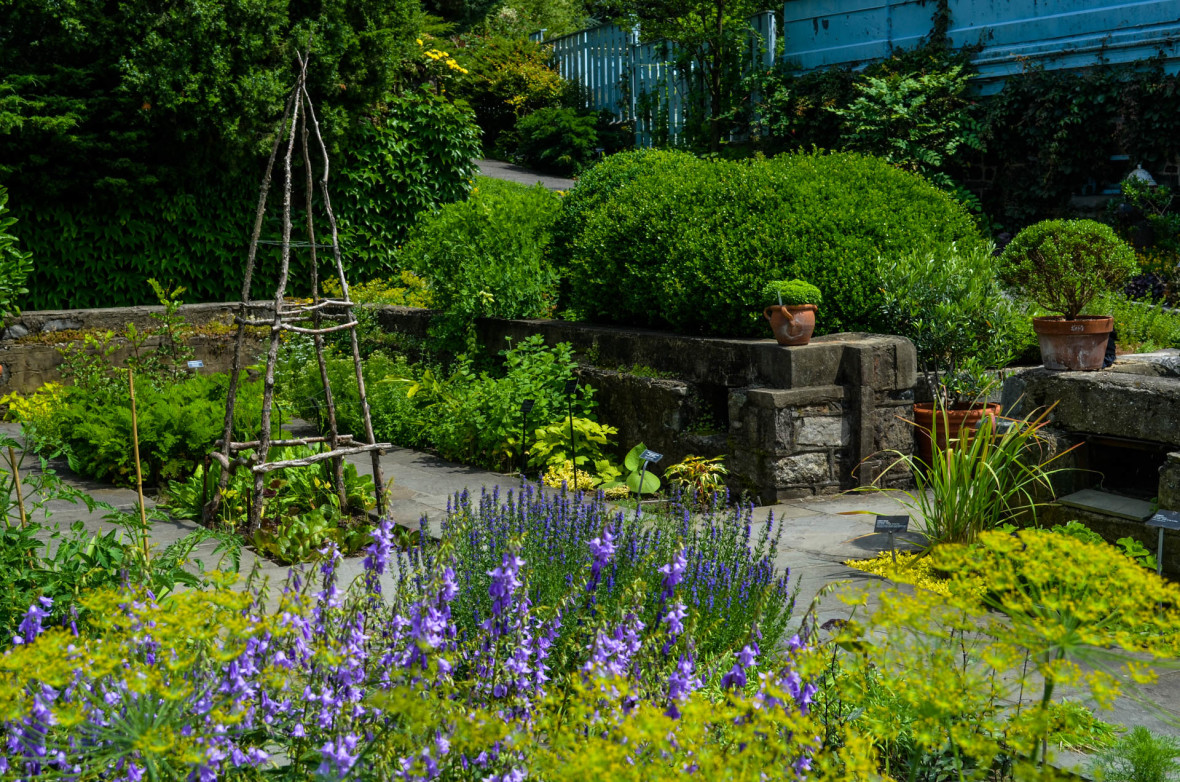
The gardens at Wave Hill blur the lines between wilderness, agriculture, and ornamental gardens: walking through the hillside Wild Garden feels like a mini hike, with glimpses of the Hudson River around each turn, while the Flower Garden features edible plants like Tuscan kale, a nod to a centuries-old practice of planting flowers and vegetables side-by-side. The garden is also home to 500,000 honeybees, whose hives you can explore with Wave Hill’s resident beekeeper during the summertime on Open Apiary days (free with admission). On Sundays, admission ($10; free on Thursdays) will also get you access to the weekly Family Art Project (10:00 a.m.–1:00 p.m.), followed by a Garden Highlights Tour (2:00 p.m.). Make sure to take advantage of the MTA Away Deal to save up to 25% on your train and admission tickets.

